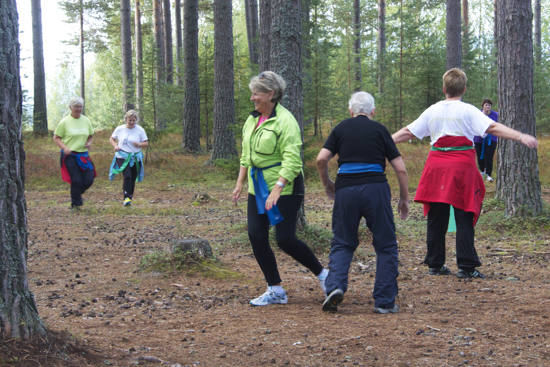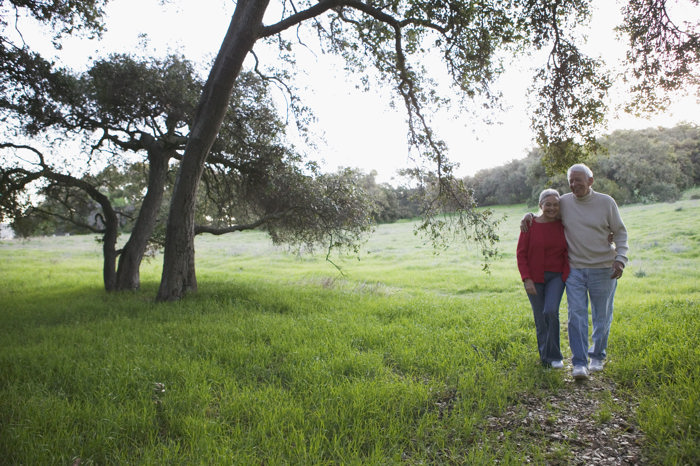The effects of regular physical activity on mental health problems are well-documented, both as prevention and treatment. This applies to both the effect in connection with the activity itself and the long-term effects.
Recommendations on physical activity and mental health
Physical activity is important in looking after and improving mental and physical health. Regular physical activity improves our physical fitness and makes us better equipped to cope with the demands and challenges of everyday life.
Every physical activity counts, also activity of short duration and light intensity. For example, getting up and moving for a few minutes at a slow pace will provide health benefits. People who have a low level of activity will have the greatest benefit from increasing their activity level during the week.
Adults and the elderly are advised to be physically active so that they become slightly out of breath for at least 150 minutes, i.e. at least 2.5 hours each week. The level of activity should be sufficiently intense to make you feel warm and a little breathless. If you are able to do more, it is good for you. Your activity can be divided into several shorter periods, for example by taking two or more short walks a day. You should also reduce the amount of time you sit still by breaking it up with active breaks.
The effects of physical activity
Physical activity can
- be a source of enjoyment, mastery and positive experiences
- positively affect mood
- boost energy levels
- reduce stress
- improve self-esteem
- improve sleep
- offer a sense of togetherness and improve quality of life
- provide good nature experiences
- suppress withdrawal symptoms
- improve weight control
- reduce symptoms of anxiety and depression
- reduce the risk of dementia
- improve cognitive function
- prevent disease
Anxiety
Regular physical activity in line with the national recommendations, may reduce anxiety. However, even a single workout can help reducing the symptoms.
Depression
The positive effects of physical activity as a treatment method in connection with mild to moderate forms of depression are well-documented. Some studies show that physical activity can reduce depressive symptoms just as well as drug treatment using antidepressants.
Active steps to better physical and mental health
Start gently and gradually become more active through daily chores
Look for different opportunities to become more physically active in your everyday life. All activity counts, including activity with low intensity and short duration. For example, only 5 minutes of walking could be useful. You can also walk or cycle to and from work, take the stairs, do housework, and take a walk or two during the day, with or without a dog.
Learn how physical activity affects your body
Your body’s response to physical activity that increases your heart rate and causes you to sweat can be similar to the body’s responses to certain types of anxiety, such as palpitations, high heart rate and sweating. This is completely normal during physical activity and nothing to worry about.
Many people overexert themselves and lose their motivation. To experience mastery and really benefit from your exercise, it is important to start at a level that is right for you, gradually increase your level of activity and intensity, and find a good balance between being active and resting.
In the longer term, most people find they have more energy and can take on more in their everyday lives.
Choose an activity you enjoy
Starting with an activity you find fun or enjoyable can have a positive effect on your emotions and mood. It is easier to continue with an activity you enjoy over time.
Arrange to do activities with other people
It can be easier to get started with regular physical activity if you arrange to exercise with someone else. Being active with other people gives you a sense of togetherness. Exercising in a group also provides you with opportunities to make new friends and contacts.
Seek support to get started
Ask someone you know whether they would like to take part in an activity with you. It can be enjoyable to have a neighbour, friend or relative as a training or walking partner. Health professionals can also provide invaluable support.
Make some goals
It is more likely that you will be able to maintain the level of activity if you set some concrete short-term and long-term goals. Choose realistic goals and rather adjust your goals along the way.
Physical activity offers in Norway
A wide variety of public, voluntary and private organisations offer opportunities for physical activity. Many of them offer outdoor activities and walking groups, as well as sessions in swimming pools, climbing walls, obstacle courses, gyms and dance studios. Walking is a good self-organised activity.
Healthy Life Centres
Many municipalities have Healthy Life Centres (Frisklivssentraler). This is a municipal health service which offers guidance and support to people who want to become physically active. In addition to their own services, the Healthy Life Centres also offer an overview of other activities and services that are available within the municipalities.

Healthy Life Centres
Here, you will find more information about healthy life centres and contact details for the healthy life centre in your municipality.
Illustration: Inger M. Skarpaas/Helsedirektoratet
